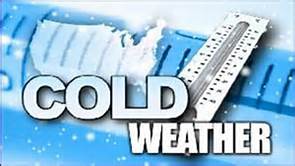 is finally here for most of you and with that special things you need to take care of now and be reminded of before you have a problem.
is finally here for most of you and with that special things you need to take care of now and be reminded of before you have a problem.
For those that do not work in the colder weather all equipment and supplies need to be winterized. Washers filled with a RV antifreeze solution. 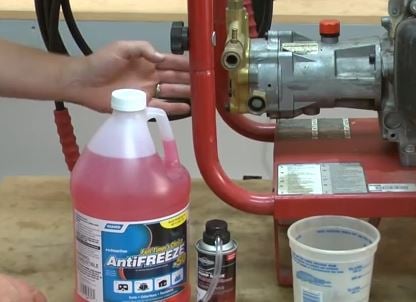 Hoses should also be air dried out and not allowed to freeze where the cold may damage the hose material. The contraction and expansion of freezing and thawing will cause many hoses to get micro cracks which will shorten the life of the hose and possible cause serious safety issues for personnel and equipment later on. You can also apply lubricants or coatings to hoses that you are using out in the cold, to keep their materials supple, to reduce cracking.
Hoses should also be air dried out and not allowed to freeze where the cold may damage the hose material. The contraction and expansion of freezing and thawing will cause many hoses to get micro cracks which will shorten the life of the hose and possible cause serious safety issues for personnel and equipment later on. You can also apply lubricants or coatings to hoses that you are using out in the cold, to keep their materials supple, to reduce cracking.
For those that will still be working in this cold weather make sure your equipment is is top shape, that you have changed the oils over to cold weather strengths, that you allow your machines to warm up longer and properly before putting a load on them. That your other fluids are at full levels or when possible with small amounts of antifreeze to reduce the chance of freezing. Tires will loose pressure due to the cold temps so be sure to check levels often. Check battery charges often as cold drains them faster. At 32 degrees a fully charged battery only has a 65% cranking capacity while an engines starting requirement can increase from 100 up to 155%.
Keep liquid chemicals from freezing by keeping them in insulated enclosed boxes or behind wind breaks. Containers should be kept full as possible, as larger volumes of liquids take longer to freeze. You might even consider placing a large cooler on your rig to keep chemicals in, as a cooler will keep cold out and a steady inside temp as well as it does to keep cold in when used as a normal cooler.
And there are other safety issues to consider. Controlling water run off while washing which may freeze causing slip and fall situations. You may need to stock up and carry, signage, litter or ice melt to spread out on walk ways and work areas. Carrying anti slip tire tracks and a small shovel to get a vehicle and trailer out of snow, ice or mud from snow melt if needed.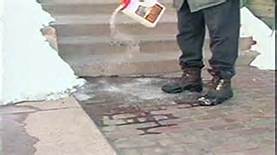
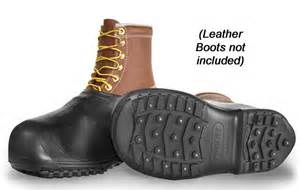
You need to make sure your employees know how to dress and stay dry while working in the cold so not to get hypothermia or frostbite.They need to wear hats, 10-50% of body temp can be lost from the head, waterproof gloves, warm wool socks (not cotton), and waterproof foot wear with non slip treads or added cleats or tread covers. Under garments with moisture wicking action will keep sweat wet away from their skin. Small hand and foot warmers will make it more comfortable to work out in the cold. Wearing a neck gator or scarf placed over your mouth will keep the cold air out of your lungs.
Do not let the colder weather stop you and your workers from drinking and staying hydrated. People tend to not drink as much in the cold which is a mistake when you are still exerting your self even if you can not feel the sweat. Drinking sips of warm drinks will help keep your core temp up but refrain from caffeine usually found in coffee and tea by drinking decaff as caffeine increases blood flow which will cause the body to loose heat faster.
Also stopping to eat small high calorie items like power bars as a snack, even just a few bites at a time, will keep your core temp up as your body will send blood to your stomach to digest it. Working at an even pace will keep you warm where moving too fast will cause you to sweat and burn calories needed to keep you warm that can bring on hypothermia or cause stress to your circulatory system which may bring on a stroke or heart attack.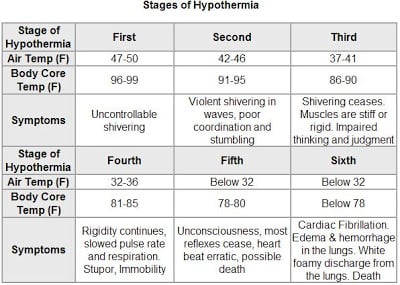
Remember to be aware of wind chill as it can damage any exposed skin well before you realize it. Know the signs and stages of hypothermia and frost bite. Have employees keep extra socks and
Try and take frequent rests periods out of the wind and cold to allow your body to warm up but resist the urge to make the rest area hot. Moving from very cold to very hot locations will make you feel colder when you go back out and if the heat has caused you to sweat on your skin the evaporation will cool you down even more rapidly. Be careful if you are using an enclosed rig that it is properly ventilated so not to have dangerous fumes from building up including CO2 and carbon monoxide that you can not smell.
I hope these tips help keep you and your employees warm and safe during the winter cleaning season.